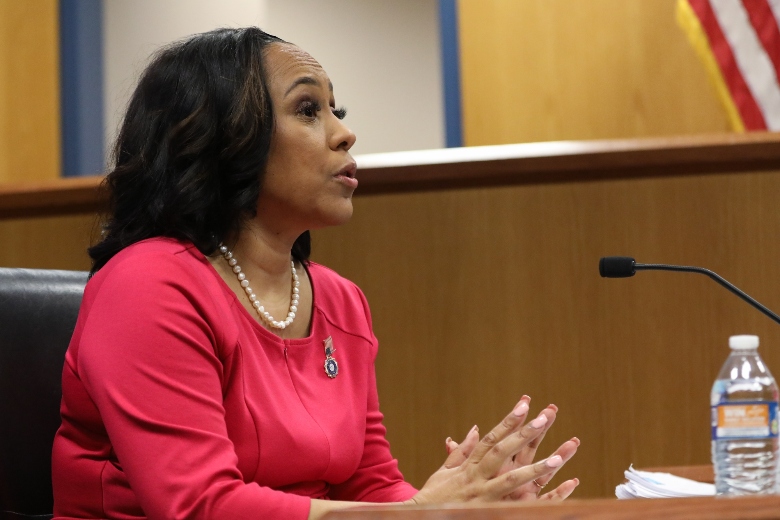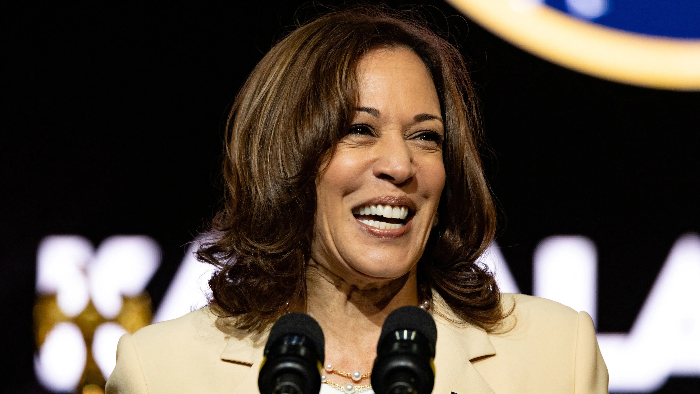In a dramatic turn of events, the Georgia Court of Appeals has disqualified Fulton County District Attorney Fani Willis and her office from prosecuting former President Donald J. Trump and his associates in the highly controversial RICO case. The case, alleging interference in the 2020 presidential election, has captured national attention and just took an unexpected twist that could reshape its trajectory.
The ruling stems from a finding of “appearance of impropriety” surrounding Willis’s involvement, an issue that has plagued the case since its inception. The appellate court’s decision follows Fulton County Judge Scott McAffee’s earlier order for either Willis or her special prosecutor, Nathan Wade, to step aside. While Wade resigned, the appellate court concluded that Willis’s continued participation compromised the integrity of the case too severely to allow her to proceed.
Anchored In Oklahoma Podcast
The appellate court’s decision was clear and unequivocal. “After carefully considering the trial court’s findings in its order, we conclude that it erred by failing to disqualify DA Willis and her office,” the ruling stated. The judges further elaborated that while an “appearance of impropriety” alone is typically insufficient for disqualification, the unique circumstances of this case left no other option.
Key pretrial decisions, including whom to prosecute and on what charges, were cited as areas where Willis’s involvement undermined public confidence. The appellate panel determined that no alternative remedy could restore trust in the proceedings, necessitating her removal and that of her office.
Adding to the complexity, the court clarified that Willis’s disqualification extends to her assistant district attorneys. Since their authority derives solely from her office, they lack the jurisdiction to proceed in her absence. This effectively puts the RICO prosecution in a state of legal limbo until a new prosecutorial team is appointed.
The disqualification deals a significant blow to the momentum of the RICO case, which alleges a coordinated effort by Trump and his associates to overturn Georgia’s 2020 election results. Accusations include pressuring state officials and promoting false claims of voter fraud. Trump has consistently denied the charges, framing the case as a politically motivated attack.
While this development represents a notable victory for Trump’s legal team, it does not dismiss the charges entirely. The appellate court rejected Trump’s motion to dismiss the case on due process grounds, leaving several pending motions that could further influence the case’s future.
The need for a new prosecutorial team introduces significant delays and challenges. Legal experts predict months, if not longer, will be required for new prosecutors to familiarize themselves with the intricate evidence and legal arguments. This transition could weaken the prosecution’s case, aligning with the defense’s broader strategy to discredit and delay.
The appellate court’s ruling is a severe setback for Willis, who has faced mounting criticism for her handling of the high-profile case. Critics have long questioned her impartiality, citing alleged conflicts of interest and her close association with Nathan Wade, the special prosecutor who resigned earlier in the proceedings.
Judge Scott McAffee’s initial concerns about the appearance of impropriety proved pivotal. Although Wade’s resignation addressed some issues, the appellate court found that it did not go far enough to mitigate the damage to the case’s integrity. By removing Willis and her office entirely, the appellate court has emphasized the importance of impartiality and public trust in high-stakes prosecutions.
The disqualification introduces further delays to an already complex case. With new prosecutors required to take over, the trial timeline will likely be pushed back significantly. This disruption may benefit Trump and his co-defendants, who have consistently sought to undermine the prosecution’s credibility and delay proceedings.
Beyond logistical challenges, the decision highlights broader concerns about the politicization of the judicial process. The case has become a flashpoint in the national debate over election integrity and the ethical responsibilities of public officials. By prioritizing the integrity of the judicial process, the appellate court has sent a strong message about the need for impartiality, even in politically charged cases.
While the disqualification marks a significant victory for Trump, his legal battles are far from over. The RICO case remains active, and the pending motions to dismiss could still alter its trajectory. Additionally, appointing a new prosecutorial team raises questions about the case’s long-term viability and the challenges of maintaining momentum after such a significant shake-up.
The decision also reignites questions about the role of public perception in high-profile prosecutions. By removing Willis, the court has not only addressed immediate ethical concerns but also aimed to bolster public confidence in the judicial system. However, the move is unlikely to quell the fierce debates surrounding the case and its implications for Trump’s political future.
The Georgia Court of Appeals’ ruling marks a critical juncture in the RICO case against Trump. It underscores the challenges of navigating legal proceedings in the shadow of political controversy and the ethical dilemmas faced by public officials in such cases. As the case moves forward, all eyes will remain on Georgia’s judicial system and its ability to maintain impartiality and public trust in this high-stakes legal battle.




I don’t see this as a legal victory for Trump but rather a defeat for the corrupt and ethically challenged Fulton county voters and their DA.
Unfortunately,
There was PLENTY of proof, but the Jewish Nazi sympathizer Soros’ green tentacles reaches deep into our entire legal system. (This is one of those times the moniker has been proven true and used correctly.)
Dominion machines proven faulty in several ways such as vote switching and world wide election interference via illegal internet connections to name only 2 problems.
Video proof of ballot drop box stuffing and tampering.
Illegal ballot harvesting.
Ballot counting facilities sabotaged to disrupt proper counting and bi-partison participation.
Unpurged voter roles.
Ballot counting after deadline.
Dem ballot counting officials personally guilty of interference with Republican officials.
Multiple ballot passes after rejection.
Let’s not mention that Hillary Clinton seems to be VERY involved with Dominion. She also seems to be benefitting from other countries while using these tactics.
Fat Fanny Willis should be in prison for all her corruption fraud lying to judges and the court
Spent millions of taxpayers money on a fraud bogus case and her fat ass is to stupid to realize she’s in major corruption trouble. She better have good attorneys because she’s going to get hit in a lot of indictments and law suits and for her corruption against Trump.
And destroying official democrats and hiding discovery documents. Stealing campaign funds
Personal suits from Trumps organizations her fat ass is going bankrupt and to prison. She will loose a lot of weight in prison. Hope she enjoyed all her vacations on taxpayers money
Just another dumb corrupt democrat asshole